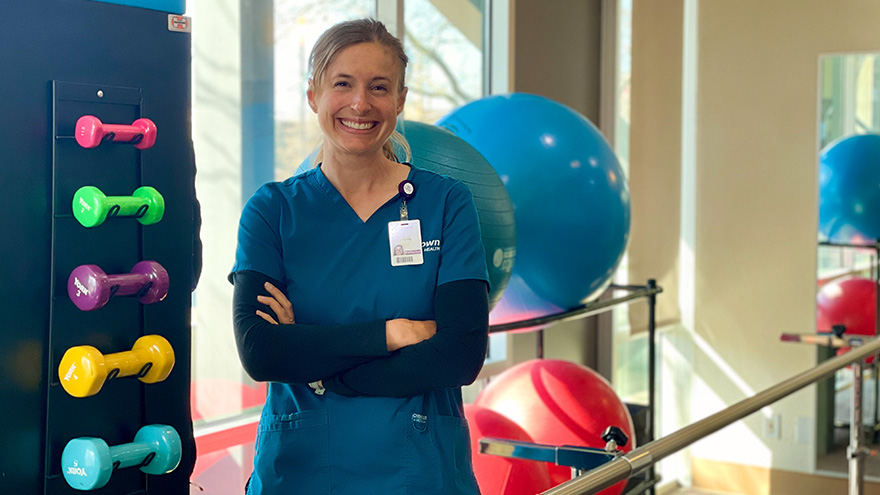Search
-
Know Before You Go
Grab your skis, goggles, coat – and don’t forget that helmet. Skiing and snowboarding are fun activities for all ages but come with the risk of injury. Read on for tips to make it a safe day on the mountain. Daydreaming about your next trip to the slopes? We talked to Jared Worchel, DO, about his top tips for gearing up. Get the Gear Before you head out to ski or snowboard, make sure you have all your gear ready and in good condition. Everything should fit correctly so that it keeps you as safe as possible. Wearing proper gear will also help keep you warm. Items to check on before you head out include: Boots Bindings Goggles Poles Helmet Outwear Gloves Pack water and snacks in case the drive takes longer than you except due to weather or traffic. You’ll also want to make sure that your cell phone is fully charged before you head out in case you need to contact friends of staff for help while on the mountain. Helmet, Helmet, Helmet Having a helmet that fits correctly is the most important thing you can do to prepare for a safe day on the mountain. According to a National Ski Areas Association study, helmet use has increased over the last 15 years, with 80 percent of skiers and snowboarders using helmets. Schubert would like to see that number increase to 100 percent. “If you have a head injury it could take you out for the rest of your life,” Dr. Worchel said. “The most important things to think about when fitting a helmet are making sure that it really fits you appropriately. You want to go into a store and try on as many different helmets as they have available. I know it’s tempting to buy one online, but you’re never going to know if it fits correctly.” If you are in an accident, your helmet’s fit can help protect you. Dr. Worchel has some tips on fitting: A helmet should fit low and snug over the head. Make sure that the helmet doesn’t wiggle or feel loose. Look for a model that has adjustability in the back, which will help you make sure it fits snugly. F ind a helmet with a chin strap that will help it stay in place throughout the day.
-
Alzheimer's Safety Tips for Caregivers to Know
November is National Alzheimer’s Disease Awareness Month. At Renown Health, we know that Alzheimer's safety for your loved one is a priority, as the symptoms can sometimes lead to unsafe situations. We asked Dr. Jonathan Artz – a neurology physician with Renown Health and an assistant professor of clinical neurology at the University of Nevada, Reno School of Medicine – for tips on keeping loved ones safe and secure. According to the Alzheimer’s Association, Alzheimer’s disease affects safety in various ways, specifically due to body and brain adjustments. These changes can include: Judgment, including forgetfulness Sense of place – getting lost on the way home Behavior – being suspicious or fearful Body difficulty – losing balance Sensing ability – noticeable sensitivity in hearing, seeing or temperature Dr. Artz gives us four major tips to ensure your loved one’s safety as you both navigate this disease together. Watch for Wandering Those experiencing Alzheimer’s disease tend to wander and get lost. Try the following tips to reduce the risk of wandering: Get your loved one an ID bracelet and have them wear it at all times. You can also enroll your loved one in “Wandering Support.” Install door chimes so you know when exterior doors are open. Ask neighbors to call you if they see your loved one out alone. Go with your loved one when they insist on leaving the house. Don’t argue or yell. Instead, use distraction or gentle hints to get them to return home. Discourage Driving Driving can be unsafe for someone with this disease. With this in mind, ask a doctor whether it’s safe for your loved one to drive. For example, on a case-by-case basis, there are certain situations where doctors are required to report individuals with particular cognitive impairments, wherein a form of a driving assessment will be recommended. Limit access to the car. Keep the keys with you or lock them away. Ask an authority figure, such as an insurance agent or a doctor, to tell them not to drive. Adult-Proof Your Abode A simple living space is a safe living space. This means reducing clutter and removing any issues that may pose a safety concern. You may also want to get advice from an occupational therapist (home safety expert). Keep in mind that some changes may not be needed right away. Focus on major safety concerns first. Try the following tips: Add lighting (or glow-in-the-dark tape) to brighten dark areas, including stairways and halls. Use color contrast or texture indicators for dials, knobs and appliance controls. Remind your loved one not to carry items while walking to avoid a fall. Remove sharp objects from drawers and countertops. Avoid using small throw rugs or doormats, as they are easy to trip on. Move frequently used items so that they are easy to reach. Lock away alcohol and tobacco products, as they are not recommended for dementia patients. Install handrails in the shower, tub and near the toilet. Bathroom falls are especially common. Adjust the setting on your hot water heater so water does not scald. Those with Alzheimer’s can lose their sensitivity to temperature. Move and lock up hazardous chemicals and cleaning supplies, such as bleach and insecticides. Disable and remove guns or any weapons. Supervise any medication taken by your loved one. Promote a Positive & Healthy Lifestyle Continually emphasize the strengths of your loved one by promoting participation in meaningful activities, wellness visits and healthy habits to help them improve their well-being. Here are some ways to keep them physically and mentally active: Maintain regular vision and hearing screenings and make necessary adaptations. Establish a routine for daily activities. Encourage participation in self-care and leisure activities. Work with your loved one’s doctor to establish a healthy diet. Ensure proper hydration. It may help to set reminders for your loved one to drink fluids. Encourage regular exercise. Exercise delivers oxygen to the brain, improving brain health. Promote good sleep habits. Good quality sleep can increase overall brain health and has been associated with improving memory, attention and concentration. Resources and support are available with the Renown Memory Disorders Program. Providers within this program are specifically dedicated to treating several different memory-related disorders. Memory Disorders Resources & Support.
Read More About Alzheimer's Safety Tips for Caregivers to Know
-
Attending Burning Man? Health Tips From Renown
Renown Health welcomes you back from Burning Man. To make sure you have the support you need, here are some tips on where to get healthcare after your return from the playa. Our urgent cares see patients 365 days a year for medical concerns that are urgent but not life-threatening. This can include fractures, cuts, burns, sprains, fevers, animal bites, rashes, sore throats and fevers. Where To Get COVID-19 & Monkeypox Tests in Reno-Sparks Renown Health’s emergency rooms do not provide walk-in COVID-19 or monkeypox testing for patients. If you are experiencing symptoms related to COVID-19 or monkeypox, we recommend you make an appointment with your primary care provider or visit one of our urgent care locations. Testing for COVID-19 is also available at local pharmacies in the Reno-Sparks area. Please visit Washoe County's COVID-19 page to learn more. Labor Day Holiday Hours: Fernley and Fallon urgent care locations will be open from 9 a.m. to 3 p.m. on Monday, Sept. 5; all other Renown urgent care locations are open from 9 a.m. to 5 p.m.
Read More About Attending Burning Man? Health Tips From Renown
-
Concussion Risks and Prevention
It’s important to be aware of the risk of a concussion, which can have serious health implications. Susan Park, MD, discusses the effects of concussions and how they can be prevented. According to Susan Park, MD, a Renown Medical Group doctor who specializes in sports and family medicine, concussions are a serious issue — especially among children whose developing brains “are more susceptible to brain injury and long-term effects from concussions.” All parents, coaches and athletes, she points out, should be aware of the risks of concussions and take precautions to avoid them. What is a concussion and how does it occur? Dr. Park describes a concussion as a traumatic brain injury resulting from direct or indirect impact to the head or body, during which the brain shakes back and forth in the skull. This may cause some bruising of the brain. In severe cases, traumatic head injuries can cause bleeding, which if not treated quickly, can be fatal. What are the health implications of a concussion? Symptoms of drowsiness and confusion can be a sign of a concussion after a head injury. Some short-term effects may include headaches, dizziness and difficulty concentrating. Long-term concerns can further include mood disorders, sleep disturbance and problems with cognitive function-concentration, which may affect school performance. What sports carry the highest risk of suffering a concussion? Dr. Park notes participation in any impact sport can result in a head injury. But among school-age kids, she treats more concussions from football and soccer than any other sport. However, during the winter months, skiing and snowboarding injuries can be a common cause of concussions Any blow to your head, neck or upper body can result in a concussion with symptoms including, but not limited to, feeling dazed or confused, dizziness, nausea/vomiting or a headache. Initial treatment of concussions varies depending on severity. Rest, avoiding vigorous activity and a reduced school workload help young athletes recover after a concussion. Dr. Park notes that sometimes further imaging and an ER visit will be required. Otherwise, rest from activities is the main treatment, along with not returning to sports activities until further clearance from a healthcare provider.
-
Avoid Heat Exhaustion With This Simple Checklist
Young children under 4 and adults over 65 are especially vulnerable to heat exhaustion. Avoid heat exhaustion this summer with some expert tips. Northern Nevada summers can be downright hot, and although the balmy temperatures can feel great, they may cause heat-related illness, also known as heat exhaustion. Infants and children under 4 and adults over 65 are particularly vulnerable to heat exhaustion because their bodies adjust to heat more slowly. Without proper intervention, heat exhaustion can progress to heat stroke, which can damage the brain and other vital organs and even cause death. The Warning Signs of Heat Exhaustion Heavy sweating Elevation of body temperature Paleness Muscle cramps Tiredness, weakness, dizziness Headache Fainting Nausea or vomiting Cool and moist skin Fast and weak pulse Fast and shallow breathing Heat stroke happens when the body’s temperature rises rapidly and the body loses its ability to sweat. The Symptoms of Heat Stroke Body temperatures rising to 106 degrees or higher within 10 to 15 minutes Red, hot and dry skin (no sweating) Rapid, strong pulse Throbbing headache Dizziness or nausea Prevention and Treatment Make sure your air conditioner works Stay indoors and drink plenty of fluids Limit strenuous outdoor activities to mornings and evenings Drink plenty of water throughout the day Avoid caffeine and alcohol Do outdoor activities in the shade and wear light, loose clothing Take plenty of breaks and drape a wet bandanna around your shoulders to cool down If you suspect you or someone else is headed toward heat exhaustion or heat stroke, call 911 immediately.
Read More About Avoid Heat Exhaustion With This Simple Checklist
-
Three Things to Know About the Enhanced Benefits of Renown’s New Medicare Program
Renown Health recently announced that it has contracted with the Centers for Medicare and Medicaid Services (CMS) on a new program that offers enhanced Medicare benefits for Medicare beneficiaries. This new direct contracting Medicare program is designed specifically for patients with Original Medicare. Here are three things to know about Renown’s new program: The goal of the program is to help care providers work together to improve patients’ health by better coordinating patient care and reducing costs. Medicare beneficiaries who choose to sign up will have peace of mind knowing that they are in a program that ensures coordinated care along with potential cost-sharing assistance for chronic care management. Signing up for this program is easy – and it does not affect your existing Medicare benefits in any way. Simply click the button below, select either your current Renown Health or Geriatric Specialty Care provider from the drop down menu, complete the form and click “Submit Form.” It only takes a minute or two to fill out the form. You will be asked to provide the name of your primary care provider and be sure have your red, white, and blue Medicare card handy. Sign Up for Renown’s Enhanced Medicare Benefit Program Voluntary Alignment Sign Up Note: Participation in this program is voluntary. If you choose to sign up, your benefits will NOT change, and you can visit any doctor, other health care professional, or hospital. Learn more about Renown’s Direct Contracting Entity for Medicare Beneficiaries here. The statements contained in this document are solely those of the authors and do not necessarily reflect the views or policies of CMS. The authors assume responsibility for the accuracy and completeness of the information contained in this document.
Read More About Three Things to Know About the Enhanced Benefits of Renown’s New Medicare Program
-
Paola’s Story: Bringing Hope and Determination to Patient Care
You may recognize her from billboards around town or the cover of Renown's latest annual report, but what you might not know is the story behind the now-familiar face. Paola Espinoza-Patino is the oncology unit's associate nurse manager at Renown Regional, and she grounds her work in hope and determination daily. Meet Paola:
Read More About Paola’s Story: Bringing Hope and Determination to Patient Care
-
Five Reasons to Switch to Renown’s Modern-Day Pharmacy
Renown Health has two retail pharmacy locations – one at Renown Regional on Pringle Way and another on Locust Street. And while many people think of a pharmacy as where we get prescriptions and pick up refills, it’s so much more. Adam Porath, vice president of pharmacy services at Renown, discusses five benefits of switching to a Renown Pharmacy. 1. Hospital Integration With the Meds-to-Beds Program, the Renown Health Pharmacy delivers prescriptions to patients on the floor when they leave the hospital. Another thing that is interesting about the pharmacy is its integration with providers. So, if there is a problem with your prescription, the Renown Pharmacy can get hold of your provider right away. We also can see your lab results and make sure that the dose you are prescribed is the right one. 2. On-Site Vaccinations The Renown Health Pharmacy has a private consultation area to administer vaccines on-site. Their team routinely stocks more than a dozen vaccines, and you can call either location (Regional: 775-982-7737 and Locust Street: 775-982-5280) to see if what you're looking for is in stock. Appointments are available in MyChart. 3. Compounding Services Only a fraction of pharmacies in the United States provides compounding services. In the Reno/Sparks area, there are just a few and Renown Pharmacy is one of them. Traditional retail pharmacies take drugs received from a drug manufacturer and put them into a smaller container in the individual amount that the doctor prescribed for a patient. A compounding pharmacy provides medications that are not available commercially. For example, a doctor has prescribed a dose that is smaller than what is commercially available. Compounding the medication will provide the dosage as prescribed. Another example could be a child who can’t take a tablet. The pharmacy may be able to use compounding to convert medications into something that is the child can take.
Read More About Five Reasons to Switch to Renown’s Modern-Day Pharmacy
-
Are You at Risk for Stroke?
Did you know an estimated 1.9 million neurons and 14 billion synapses are lost per minute during a stroke? That’s why every second counts. Anyone can have a stroke, but your chances increase if you have certain risk factors. That’s why the best way to protect yourself or your loved ones from a stroke is to know the risks and how to manage them. You can make changes to your lifestyle to lower your risk of stroke by asking yourself the following questions: 1. Is my blood pressure normal? High blood pressure is the leading cause of stroke and the most important controllable risk factor. If you’ve had a stroke, lowering your blood pressure can help prevent future strokes. 2. Can I quit smoking? Smoking damages blood vessels, clogs arteries and raises blood pressure — doubling your risk of stroke. If you want to reduce your risk of stroke and heart attack, quitting smoking is the first step — and Renown can help you with this. Learn more: Renown Health Quit Tobacco Program. 3. Do I make time to exercise 30 minutes a day? Many studies link consistent exercise habits with lower stroke risk. Also, being overweight contributes to high cholesterol, high blood pressure, heart disease and diabetes, all increasing your stroke risk. You don’t need to run a marathon — just commit to making time to move each day. 4. Do I regularly eat processed food and sugar? Eating less cholesterol and fat, especially saturated and trans fats, may reduce the fatty deposits (plaque) in your arteries. Also, eating five or more servings of fruits and vegetables per day may reduce your stroke risk. If you are diabetic, follow recommendations to get your diabetes under control.
-
Recognizing World Lymphedema Day
To recognize World Lymphedema Day, Katherine Bunker, Physical Therapist and Certified Lymphedema Therapist (PT, DPT, CLT) at Renown, shares her experience helping those with lymphedema and lymphatic disease thrive in their daily lives. Each year, World Lymphedema Day continues to be an advocate-driven celebration and global education opportunity on what it means to live with lymphedema and lymphatic disease. We explore why this cause deserves global recognition each year on March 6 below. Types of Lymphedema Lymphedema is an abnormal collection of protein-rich fluid that causes swelling just beneath the skin. The fluid, which is filtered through the lymph nodes, makes up a network of tissues that help the body get rid of toxins, waste and other unwanted substances. According to Katherine Bunker, PT, DPT, CLT at Renown Health, this collection of fluid causes swelling, usually in the arms or legs, but can happen in other areas too. It can also cause discomfort, restricted movement and may increase the risk of infections.
-
3 Ways to Switch to a Medicaid Plan Accepted at Renown
Medicaid plays a significant role in our health care system and is the nation’s public health insurance program. In addition, this program is the predominant source of long-term care coverage for Americans. Renown Health is contracted with two Medicaid plans: Molina and Anthem. If you currently have a different plan but want to change to one that Renown accepts, you can request to change plans during the open enrollment period from January 1 to March 31. Request to change your Medicaid plan in one of three ways: Request a change to your plan, or managed care organization (MCO), by reviewing the available MCO plans online at bit.ly/MCOPlansNV and filling out the form on the webpage. Email Nevada Medicaid to ask for a plan change and include your name, Medicaid ID and the names and Medicaid IDs of any dependents in your home: MCORedistribution@dhcfp.nv.gov. Call your local Medicaid district office at 775-687-1900 (northern Nevada) or 702-668-4200 (southern Nevada) to ask about changing your plan. For more information about the Medicaid plans accepted at Renown Health, please visit: Anthem Molina Healthcare Renown Health accepts most insurances, but please visit the link below for the full list. Click here for all accepted plans
Read More About 3 Ways to Switch to a Medicaid Plan Accepted at Renown
-
Making a New Year's Resolution: It's Not Just for Grownups
The New Year is just around the corner, and many of us are making resolutions to better ourselves and improve our lives. But who says it's just for grownups? This January have some fun, and set a New Year's resolution with your child. Your children are bound to love ringing in the New Year with their very own resolutions. And there are lots of benefits to your child coming up with their own resolutions: Self-discipline, self-improvement, commitment and the value of making goals and following through. 1. Get the family involved Sit down together and reflect on the past year and discuss accomplishments and goals. 2. Make them specific Just resolving to “do better in school” probably won’t work. Set a specific goal. 3. Write them down Have each family member write down their resolution and post the list somewhere where it can be seen often. 4. Be a role model Come up with a resolution of your own. If your child sees you stick to your resolution; odds are they will too. 5. Pick a reward Having something fun to work towards can always be a good incentive. Just be sure you both agree on the reward ahead of time.
Read More About Making a New Year's Resolution: It's Not Just for Grownups











